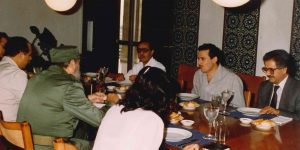
Common Room, Heyman Center
Heyman Center for the Humanities
Middle East Institute
Department of Middle Eastern, South Asian, and African Studies
In late November 1990, Fidel Castro invited three Iraqis for lunch at his place: along with Muhsin J. Al-Musawi (right), were the Iraqi Ambassador, Walid Abboud (left), and the Minister of Endowment, Abduallah Fadil (center). No protocols were in effect. Around the table there was food and conversation. It wasn’t a banquet, but an ordinary meal. Castro balanced this with wit, irony, allusion, and shrewd remarks on the nature of politics and culture. Fearing that Saddam Hussein would be driven and misled into a confrontation with the US, Castro was looking for the best method to communicate his thoughts without offending the other who would like to pose as a hero.
The talk will address the setting, the message and the intricacies of delivering a detailed warning in a pleasant and yet straightforward manner, and the panic of the Iraqis upon receiving this message.
Muhsin J. Al-Musawi is a literary critic and a scholar of classical and modern Arabic literature and comparative cultural studies. He taught for over two decades at universities in the Arab world before moving to Columbia University. He is the author of twenty-eight books (including four novels) and over sixty scholarly articles. He has been the editor of the Journal of Arabic Literature [ Brill Academic Publishers] since 2000.
José C. Moya, Professor of History, joined the Barnard faculty in 2005 after teaching at UCLA for 17 years. In addition to his teaching duties for Barnard’s Department of History, Professor Moya is affiliated with the Human Rights Studies Program. Professor Moya teaches courses in Latin American history, Latin American civilization, and world migration. He has written extensively on global migration, gender, and labor.







